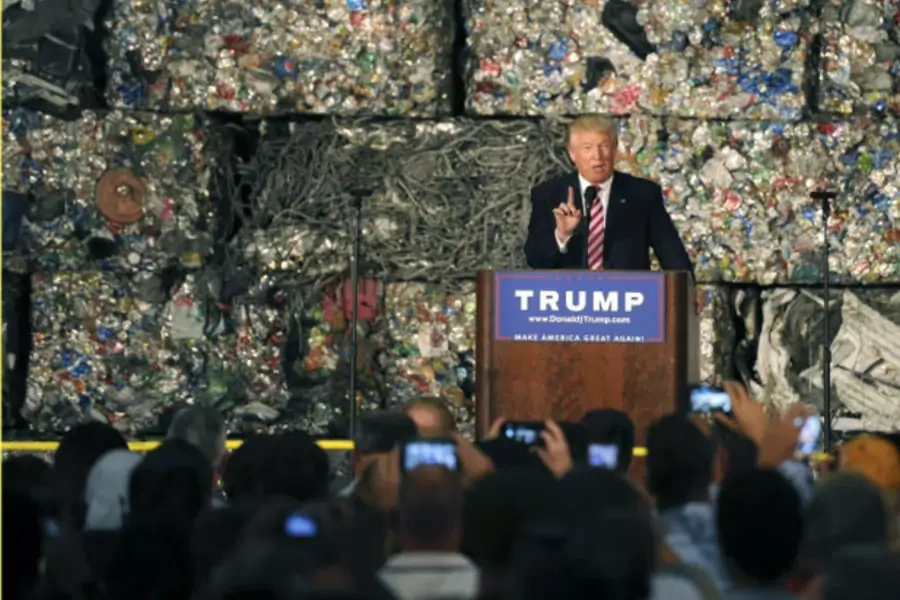Donald Trump’s Trade-Talk Trickery

After months of campaigning on nothing but the most banal of generalities about lost American greatness and crooked opponents, Donald Trump got down in the weeds last week. Way down.
In a major speech on trade in what’s left of the steel-making region near Pittsburgh, he promised to use every available presidential power to go after foreign trade cheaters, including “Section 232 of the Trade Expansion Act of 1962.”
More on:
Don’t feel badly if you have to look this one up. I’ve been following trade closely since before NAFTA, and I had to look it up too. It was passed in the Kennedy administration and allows the government to block imports that threaten to weaken an industry vital to national security. The last case was 15 years ago; it failed. One steel executive who was exploring every option to stop the recent flood of steel imports from China said: “Oh, I forgot I had this. I don’t know if it’s any good.”
It probably isn’t. And neither, unfortunately, is most of what Trump offered up in by far his most detailed policy speech of the campaign.
Trump has tapped into some real grievances about U.S. trade policy. Growing trade has been great for U.S. companies that can now play almost anywhere in the world; it has been great for American consumers, who spend half as much of their incomes on clothing as they did a generation ago and enjoy bargain prices on all the sophisticated TVs and smart phones made in Asia.
But it has been pretty lousy for some American workers, particularly in manufacturing. There were many jobs lost to cheap imports in the 2000s especially, and many of those who found new ones were forced to accept much lower wages.
But Trump’s proposals offer nothing new to solve the problems he identifies, and could make them far worse.
More on:
Consider a couple of his milder plans — bringing new trade complaints against China at the World Trade Organization and declaring China a country that “manipulates” its currency for competitive advantage. The first is a good idea — so good that the Obama administration has already brought a dozen cases against China at the WTO and won every one so far. But the cases take a long time, often several years, to work their way through the WTO courts.
Declaring China a currency manipulator is also a pretty good idea, and should have been done a decade ago when China was holding down the yuan’s value to boost its exports. Today, however, China is actually propping up the yuan to discourage Chinese citizens from moving their wealth offshore. And even if a Trump Treasury secretary did label China a manipulator, all this would do under current law is require a negotiation, with no threat of sanctions.
Other remedies Trump promises — such as Section 232 — are essentially defunct. Trade has problems, but threats to national security are rarely among them. Trump also applauded Ronald Reagan, who unilaterally slapped big import tariffs on Japanese motorcycles and semiconductors. But the United States gave away most of that power when it helped launch the WTO in 1994, and even Trump is not calling for pulling out of the WTO.
That leaves Trump’s two bigger threats — killing the recently negotiated Trans-Pacific Partnership with Japan and 10 other countries, and forcing a renegotiation of the NAFTA with Canada and Mexico under threat of U.S. withdrawal.
Both would be, as Trump likes to say, huge mistakes. The TPP is the best way for the United States to stand up to China — which would rather lead its own Asian trading bloc — and it would be really good for American companies like Google, Facebook, IBM and others that create a lot of great jobs in this country. The TPP also offers the best chance so far to open up a closed Japanese market that even the Reagan sanctions did little to pry loose.
NAFTA is far from perfect, but two decades along, it is clear that Canada and Mexico are much more partners in making things than they are rivals for investment. Ripping up the treaty would disrupt long-standing continental supply chains and likely prompt more U.S. companies to decamp for Asia or Europe.
It was encouraging for a change to hear Trump talk about what he might actually do if he becomes President. But it showed that when the man talks about policies to help renew America, he has very little constructive to offer.
This article originally appeared on nydailynews.com.
 Online Store
Online Store